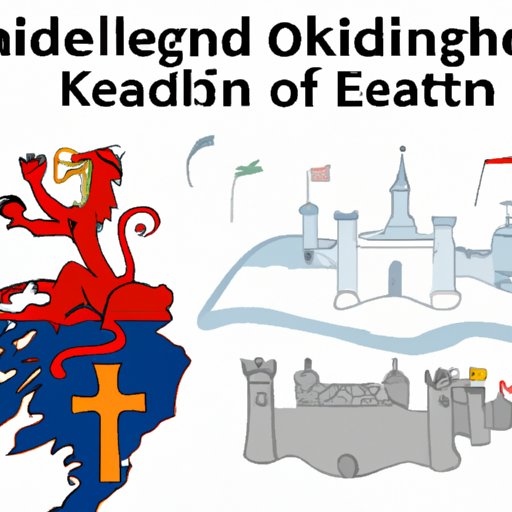Introduction
For centuries, England was divided into multiple kingdoms and territories, each with its own rulers and dynasties. It wasn’t until the 10th century that a king emerged to unify the English people and establish a lasting legacy. In this article, we will explore the life and reign of the king who united England, analyze the political and cultural factors that led to his success, and examine the lasting impact of the unification on England and beyond.
Historical Account of the Life and Reign of the King Who Unified England
The king who unified England is none other than King Æthelstan, the grandson of Alfred the Great. Born in 895 AD, Æthelstan rose to power in 924 AD after the death of his father, Edward the Elder. He faced significant challenges in his early reign, including opposition from his half-brother, Ælfweard, and Viking invasions from the north and east.
Despite these challenges, Æthelstan proved to be a capable and ambitious ruler. He launched several successful military campaigns against the Vikings, including the famous Battle of Brunanburh, which resulted in a decisive victory for the English forces. He also forged alliances with neighboring kingdoms, including Scotland and Wales, and established diplomatic relations with continental Europe.
During his reign, Æthelstan implemented significant reforms to strengthen governance and ensure justice for his people. He introduced a standardized system of law and currency, consolidated the power of the nobility, and established a network of royal officials to oversee local administration. He also supported the arts and learning, patronizing monastic schools and commissioning beautiful illuminated manuscripts.
Comparison of the Reigns of Various English Monarchs Leading up to the Unification
Before the reign of King Æthelstan, England was divided into multiple kingdoms, each with its own line of rulers. The preceding monarchs, including Edward the Elder and Alfred the Great, had made significant strides in consolidating power and expanding territory, but they were ultimately unsuccessful in forging a unified England.
The key similarities among these monarchs were their military conquests, strategic alliances, and political reforms. They all recognized the importance of a strong military and diplomatic presence to maintain power and expand territory. However, they were hampered by internal conflicts, resistance from local leaders, and external threats from Viking invaders.
What set Æthelstan apart from his predecessors was his ability to overcome these obstacles and establish a lasting legacy. He was able to consolidate power, implement effective reforms, and secure the loyalty of his subjects. His success can be attributed to a combination of factors, including his military prowess, diplomatic skill, and administrative reforms.

Analysis of the Political and Cultural Factors That Contributed to the Unification of England
The unification of England was not solely the result of military conquests and administrative reforms. There were also cultural dynamics and economic factors that played a significant role. England was a collection of diverse kingdoms, each with its own unique culture and traditions. The process of unification required a delicate balance between respect for these differences and the establishment of a common identity.
The political climate of the time was also favorable for unification. Viking invasions had destabilized the region and threatened the security of local rulers. The emergence of a strong, centralized authority was necessary for the preservation of peace and stability. Additionally, the economic benefits of unification, including increased trade and resource-sharing, provided a strong incentive for local leaders to support the process.
Biographical Account of the Key Figures Who Played a Role in the Unification Process
While King Æthelstan was the driving force behind the unification of England, he was not alone in his efforts. There were several key figures who played important roles in the process. For example, his half-sister, Æthelflæd, played a critical role in securing the northern borders of England by fortifying key towns and cities.
Other important figures included the leaders of neighboring kingdoms, such as Constantine II of Scotland and Hywel Dda of Wales, who formed alliances with England to counter the Viking threat. Æthelstan’s own officials and advisors, including his chancellor, bishop, and ealdormen, also played important roles in implementing his reforms and consolidating power.
Discussion of the Lasting Legacy of the Unified England Under This King
The unification of England under King Æthelstan had a profound impact on the political, economic, and cultural landscape of the region. The establishment of a strong, centralized authority paved the way for the development of a powerful English kingdom that would dominate the region for centuries to come.
The reforms implemented by Æthelstan, including the standardization of law and currency, set a precedent for future rulers and helped establish the legitimacy of the English monarchy. Additionally, the patronage of art and learning contributed to the development of a distinct English culture and identity that was separate from the rest of Europe.
Examination of the Impact of the Unification on the Rest of Europe and the World
The unification of England had far-reaching implications beyond its borders. It established England as a major power in Europe and paved the way for England’s eventual domination of the British Isles. It also had a significant impact on neighboring countries, particularly Scotland and Wales, which were both forced to recognize England’s authority.
Globally, the unification of England set a precedent for the consolidation of power and the establishment of centralized authorities. It also contributed to the development of a distinctive English culture and identity that would influence art, literature, and politics for centuries to come.
Closer Look at the Battles and Conflicts That Occurred During the Reign of the King Who United England
Throughout his reign, King Æthelstan faced several significant battles and conflicts, including the Battle of Brunanburh and the invasion of Northumbria by the Scots. However, he was able to emerge victorious from these conflicts, thanks to his strategic military planning and well-trained forces.
In addition to these external conflicts, Æthelstan also faced internal opposition from local leaders who resented his attempts to consolidate power. However, he was able to navigate these challenges by balancing the interests of the nobility with the needs of his subjects.
Conclusion
The unification of England under King Æthelstan was a significant event in English history that had far-reaching implications for the development of the region and the world. His military conquests, administrative reforms, and diplomatic skill set a precedent for future rulers and contributed to the formation of a distinct English identity. Today, his legacy lives on in the institutions and culture that define modern England.
